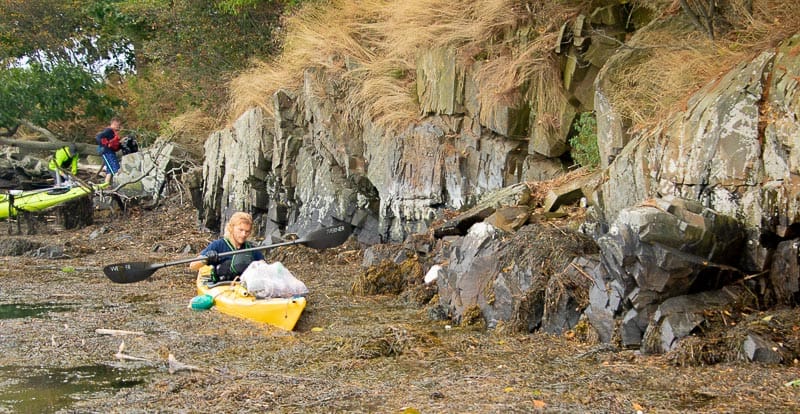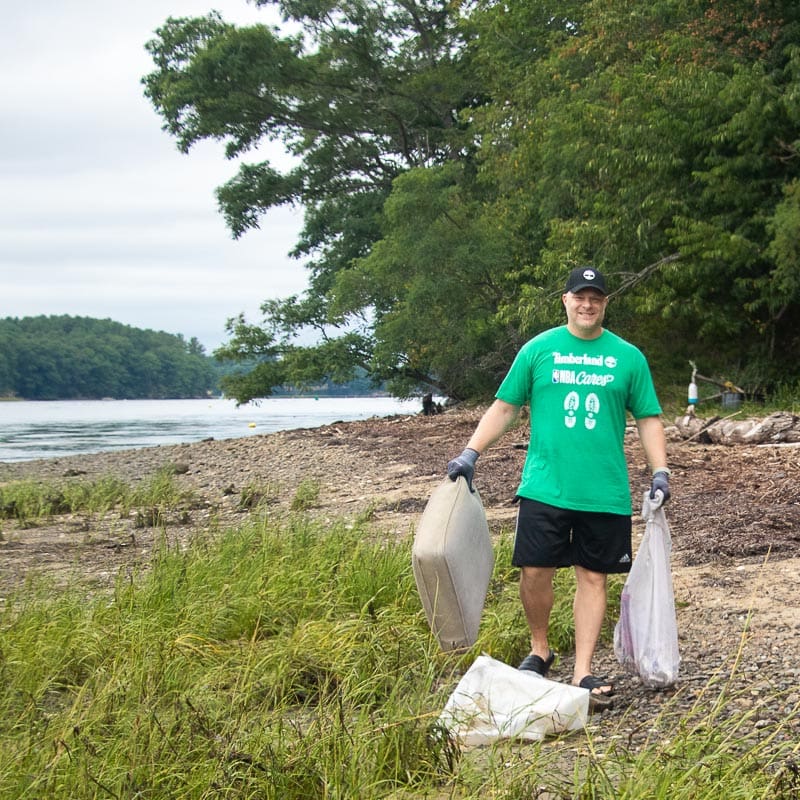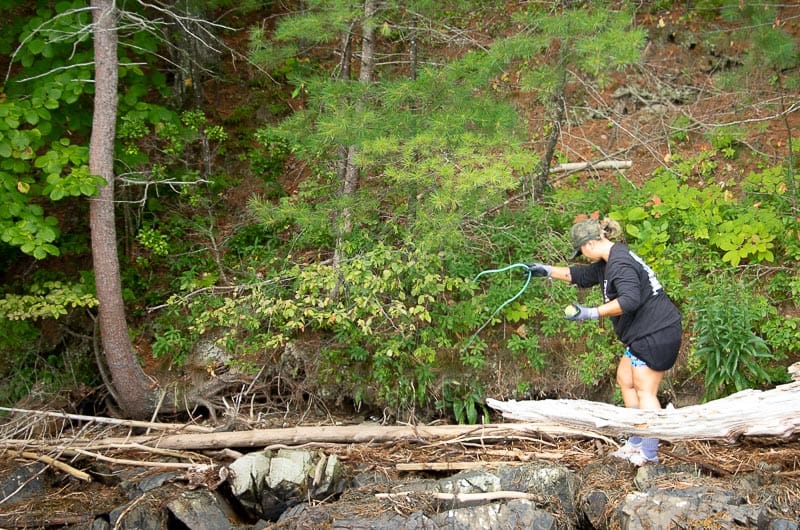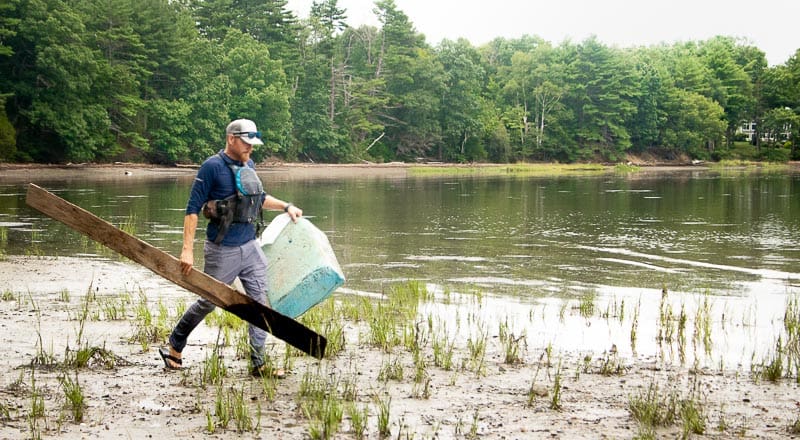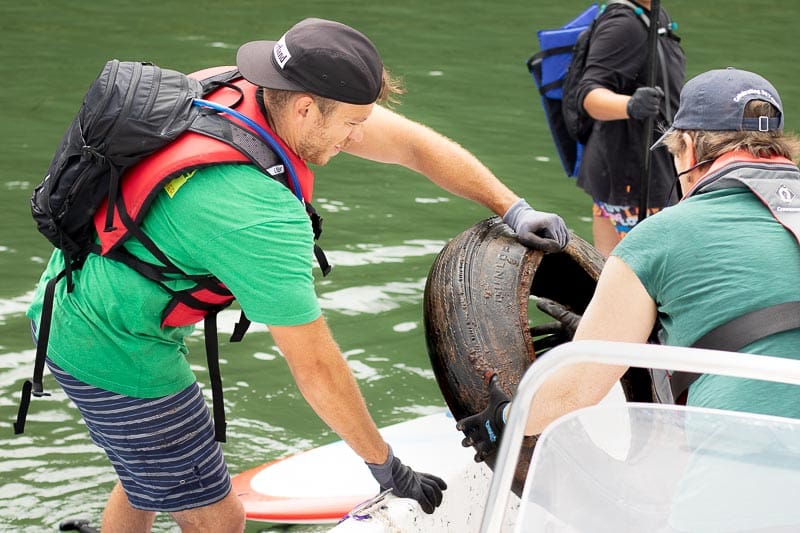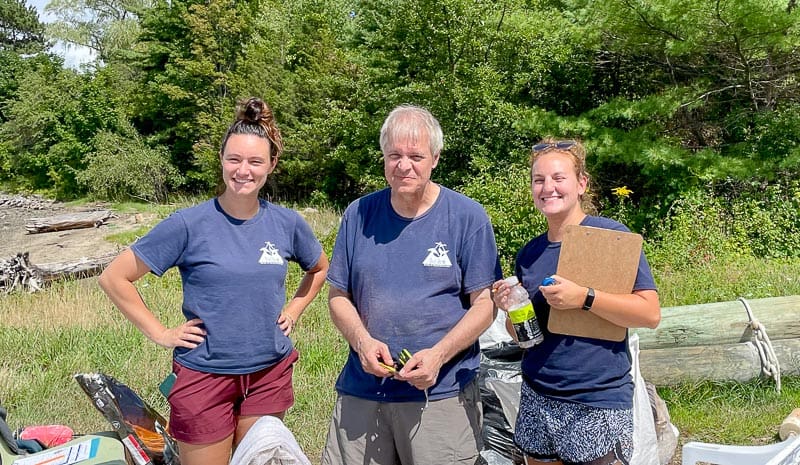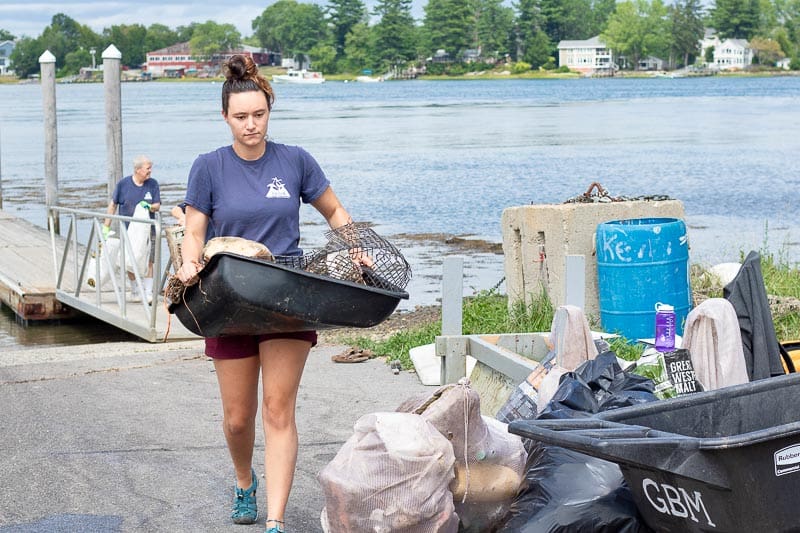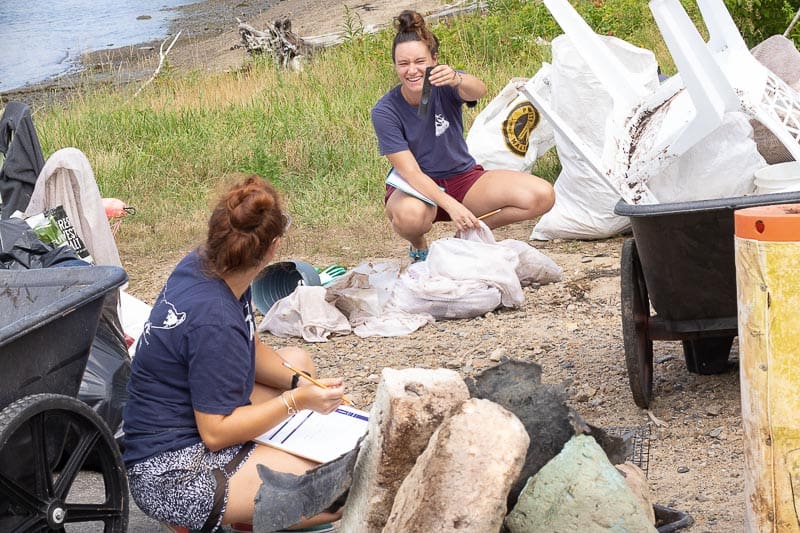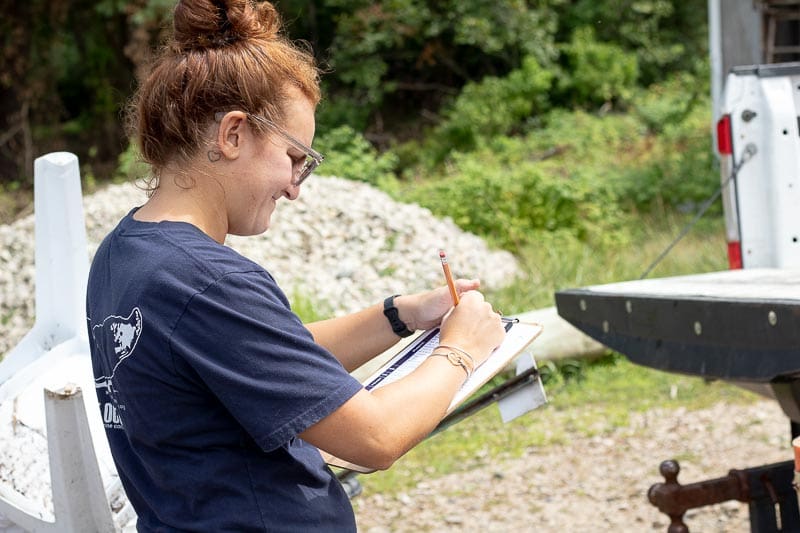On an overcast morning with gentle winds, I’m standing on the shore by the Great Bay Marine in Newington, New Hampshire alongside 30 other intrepid kayakers and paddleboarders. They’re all volunteers from Timberland, and they’ve come out to help Melissa Paly, CLF’s Great Bay–Piscataqua Waterkeeper, clean up litter in the bay.
As we take in the views and sounds of the bay, Melissa lays out the plan for the day. She’s been here at the marina since just after dawn, coordinating with a team from Seven Rivers Paddling to unload the trailers of colorful kayaks and paddleboards on loan to us for the day.
Melissa explains that we will venture into corners of the Great Bay estuary that motorized boats can’t reach. Equipped with white mesh bags and work gloves, we will free the estuary from some toxic and polluting materials and, more importantly, better understand the issue of trash pollution in our community and waterways.
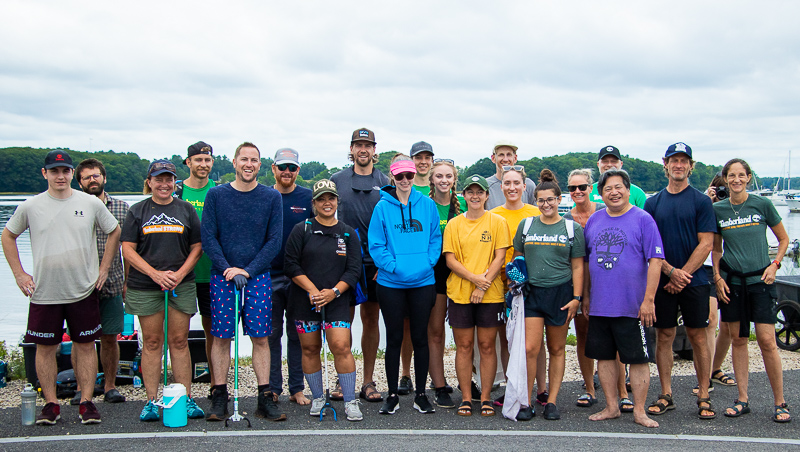
This cleanup event, first organized by CLF’s Great Bay–Piscataqua Waterkeeper in 2015, brings together volunteers and partner organizations for a day of action. After a COVID-19 hiatus, the cleanup is back with a new tactic. In addition to picking and removing debris, we will sort and count the items collected. What we find highlights the need to advocate for strong zero-waste policies in our communities.
The Health of Our Estuary Is at Stake
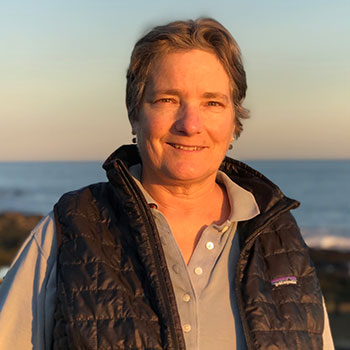
Pollution continues to push the Great Bay estuary to the brink. Outdated sewage treatment plants and sprawling development have created conditions that threaten the health of the estuary’s waters and have led to troubling signs of stress. Marine debris – human-made trash ending into rivers and bays – has also worsened these problems. This means we need all hands on deck.
As CLF’s Waterkeeper, Melissa works to engage the public in efforts to clean Great Bay’s waters and secure its healthy future. From building support for strong environmental laws to collecting critical data about pollution and water quality, her work aims to help heal the Great Bay estuary.
Getting on the Water
After we get into our kayaks or mount our paddleboards, Peter Sawtell and Hazen Kunde from Seven Rivers Paddling push us away from the beach. Slowly but steadily, we paddle into the distance along Fox Point’s shoreline – framed by lush greenery, sand, and marsh grasses. As we split into smaller teams, we keep our eyes open for shallow areas prone to litter from the rising and falling tides and search for stretches of sand where we can safely land.
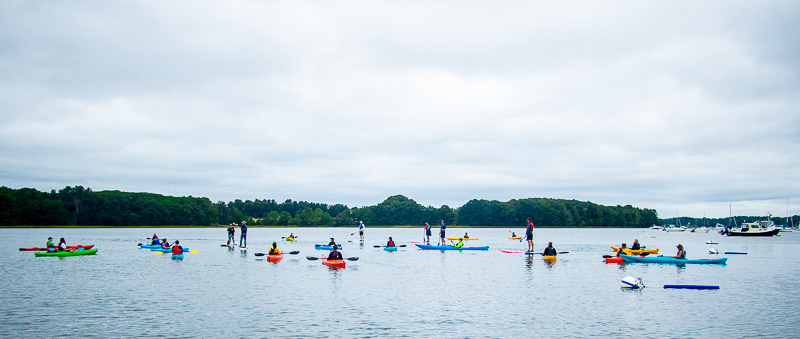
Once landed, the adventure begins. No piece of trash is too small or too big to be left behind. From bottle caps to lawn chairs, we carefully pick every piece of litter we can spot. Many of the volunteers here today have participated in this project for years, so they know the cleanup drill well. This project counts as part of their community service hours at Timberland. It stands out as one of the employees’ favorite initiatives because they can help protect nature, wildlife, and the community.
A returning volunteer bursts into laughter as she points to the unconventional list of trash she has collected so far today: a broom, a tennis ball, a single flip-flop. “It has gotten better,” she says. “One time, we found a shopping cart and a tractor tire.” She recognizes the problem persists but feels hopeful for the future of the Great Bay estuary. The volunteers fill up their mesh trash bags quickly.
On the Waterkeeper boat, Melissa makes rounds to collect the bags, loading the boat high with mounds of trash, blocks of busted dock foam, tattered tarps broken buoys, tires, and car parts. She navigates back to the Marina. Bag after bag, the volunteers unload the trash at the dock. This carefully orchestrated system continues well into the afternoon. As the clock hits two in the afternoon, I see kayakers and paddleboarders returning with broad smiles on their faces. They know today’s hard work will make a difference.
Why Are We Treating the Symptoms?
“We know that we need a systemic solution to address the problems of marine trash caused by a dysfunctional system to manage solid waste,” says Melissa Paly, CLF’s Great Bay–Piscataqua Waterkeeper. “We also know that cleanups like ours treat the symptoms, not the disease. Yet, we cannot underestimate the impact of this event.”
In a single day, we are leaving a more than two miles of shoreline cleaner than it was. Our cleanup is bringing the community together to take action and see first-hand the impact of plastic and garbage on our marine ecosystems.
What’s more, the cleanup provides us with valuable information about the waste that ends up in our waterways.
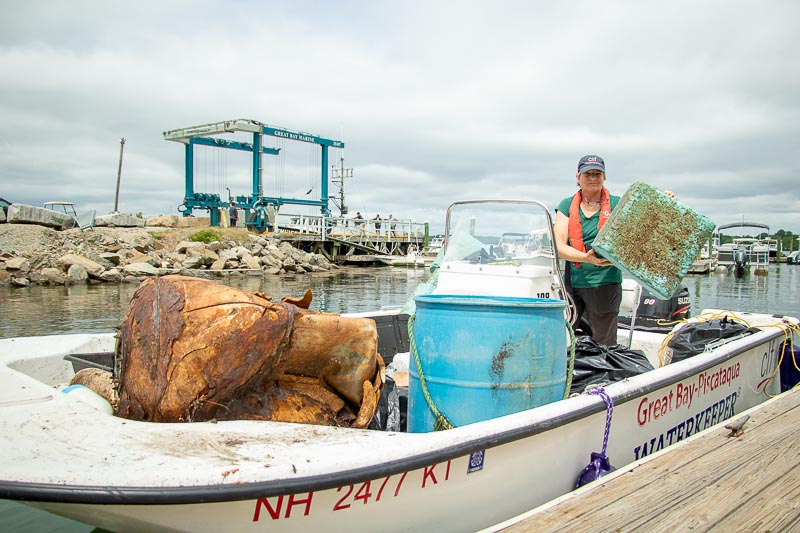
Making a Cleanup Count
We wrap up the cleanup on the water, but the work is not over yet. At the Marina, staff members from the Blue Ocean Society stand by a white pickup truck. They wait to dig deeper – literally and figuratively – into the piles of trash we collected.
Danielle Kamberalis and Nikki Tenaglia from the Society’s Marine Debris Program hold a clipboard to tally piece by piece every item the volunteers collected. Eagerly, I join them to get a closer look. We count glass, rope, plastic, foam, and wood in all shapes and sizes. My heart aches as the tally for everyday items rises rapidly. As I hold plastic bottles and straws covered in snails and grass, I’m reminded that some trash never goes away.
After dozens of bags and hours of work, our tally is over.
Plastics, Foam, and More
Our volunteers removed 2,622 pieces of trash and debris in a single day – keeping 791 pounds of trash from polluting waterways and threatening wildlife. Two familiar culprits made their way to the top of the list: plastics and foam. Our tally counted more than 700 plastic items and more than 600 pieces of polystyrene, including:
- 227 single-use beverage bottles
- 124 plastic wrappers
- 96 pieces of foam packaging
- 68 plastic bags
- 12 foam blocks from docks (as large as seven square feet)
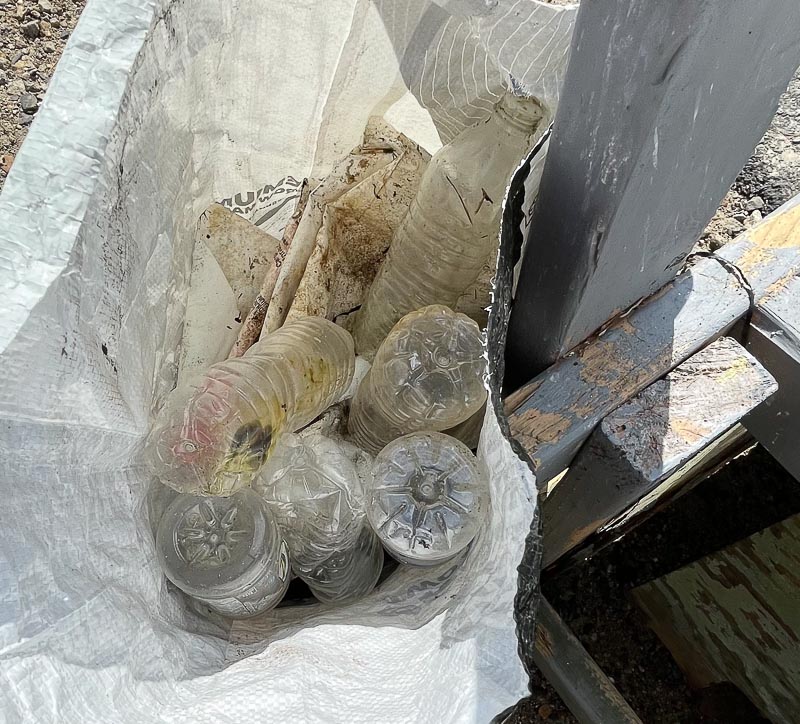
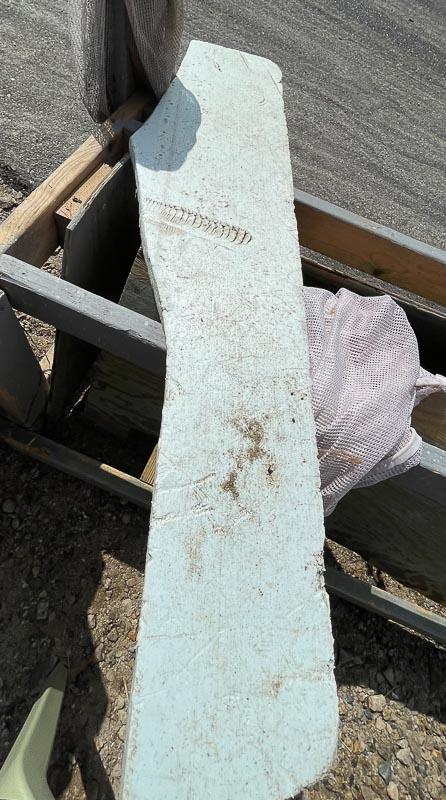
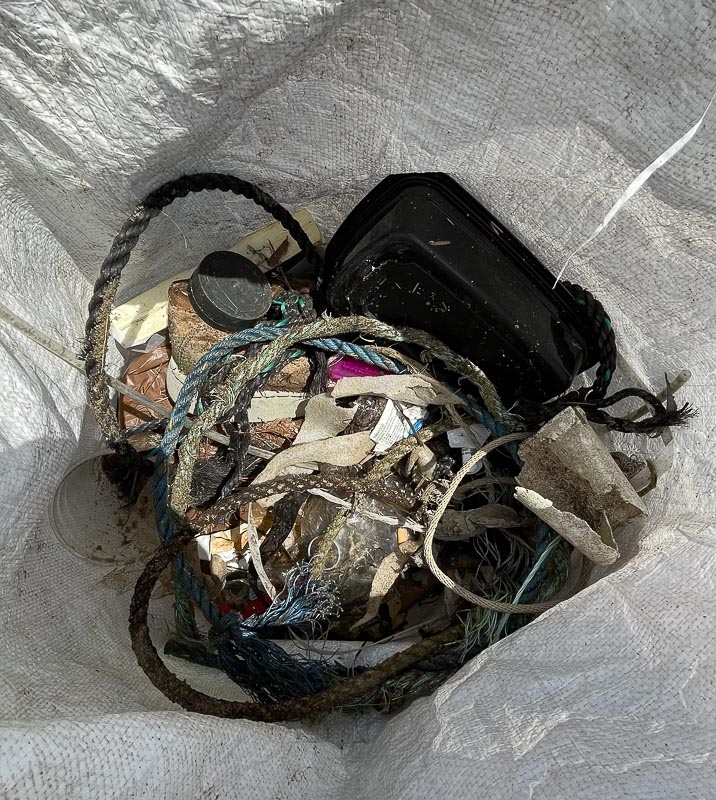
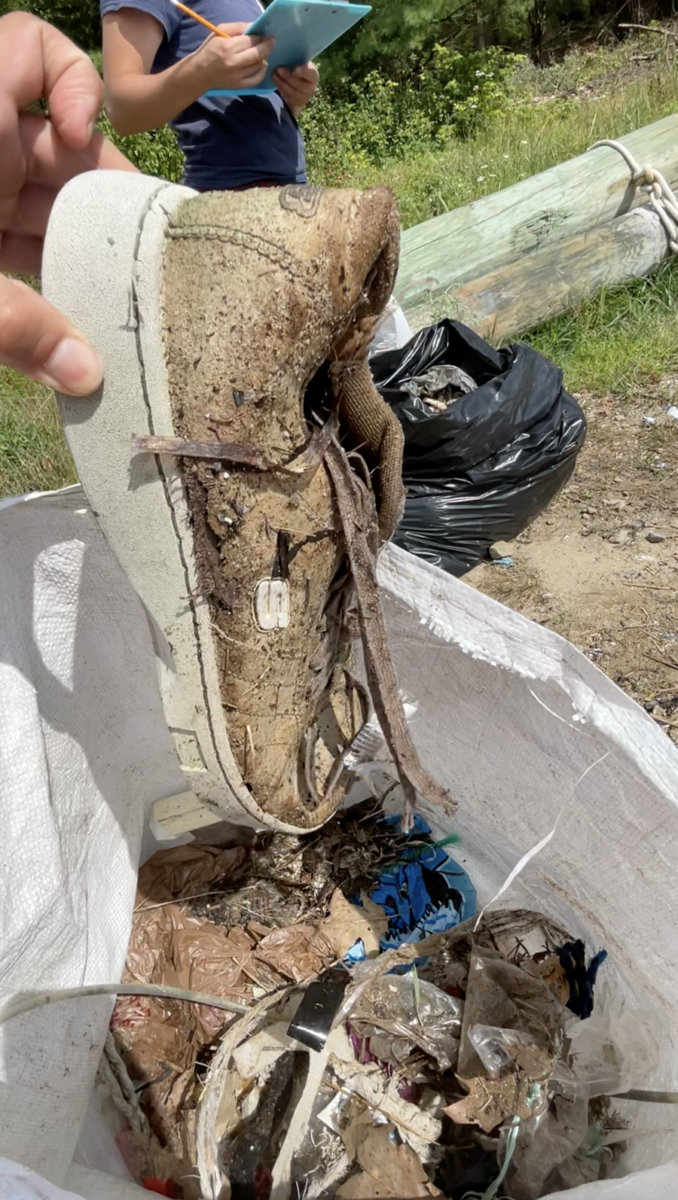
So, what happens to all the plastic and foam littering Great Bay that we didn’t get to? It breaks down bit by bit, leaving behind everlasting microplastics that, quite literally, infiltrate the entire world: from our waterways to our bloodstreams. Communities living near these areas often experience the brunt of this pollution.
New Hampshire Deserves Strong Zero-Waste Laws
Cleanups like ours play a critical role in documenting the presence of pollutants in our waterways and support the need to slash plastics. But, while we can reduce single-use plastic waste in our individual lives, the most meaningful change will happen through collective action.
We must push decision makers to fight for a clean, zero-waste future.
Other states have adopted successful recycling solutions, like “bottle bills,” also known as bottle return programs. These programs help increase recycling rates and can help prevent bottles from filling up our landfills (or, even worse, waterways). But New Hampshire has fallen behind in adopting these solutions – it’s one of the only New England states without a bottle deposit law. Our elected officials can change that.
In addition to effective recycling alternatives, New Hampshire needs better guidelines to adequately manage solid waste. In 2020, nearly two million tons of trash entered New Hampshire’s landfills – and almost half came from out of state. That’s why CLF is pushing New Hampshire’s Department of Environmental Services to come up with a plan that will reduce the amount of waste produced in the state – and limit what gets imported into the state.

Lastly, we need to hold corporate polluters accountable for the plastic they create. You can help. Urge your state legislators to pass a modern producer responsibility bill like Maine did in 2021.
As I stand on the shores of Great Bay at the end of the cleanup, I can’t help but daydream about a future when cleanups like this become a thing of the past. I imagine a day when these waters attest to our ability to reinvent the systems behind waste and keep our marine ecosystems clean and healthy.
For now, I leave with the joy of having met fierce volunteers and advocates who, on and off the water, will continue to fight for the zero-waste future we deserve.

